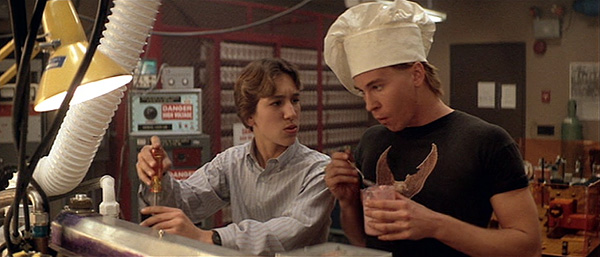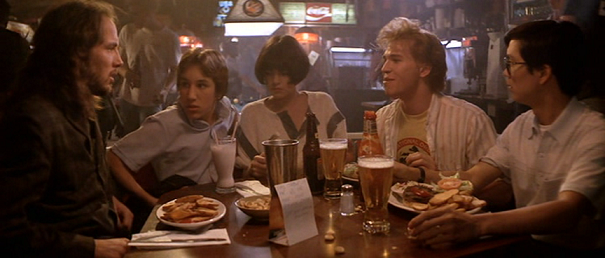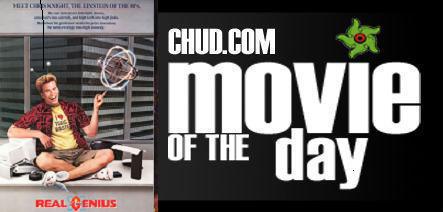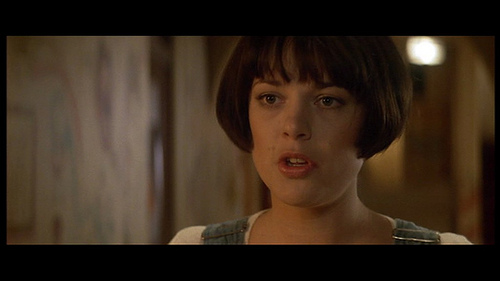The Film: Real Genius (1985)
The Principals: Val Kilmer, William Atherton, Gabe Jarret, Robert Prescott, Michelle Meyrink, Jon Gries, Martha Coolidge (director)
The Premise: A genius-level fifteen-year-old named Mitch (Jarret) gets recruited to a prestigious college to work on a laser for Doctor Jerry Hathaway (Atherton), and work with somewhat more famous genius Chris Knight (Kilmer). It turns out the world of a college for nerds is no different than high school (or life).
Is It Good?: Yes, but let me start by saying I don’t know if any of you follow me on twitter (@houx), but The Social Network came out Tuesday, and like many I watched the film that night (actually my review should be up on Collider shortly), and I thought to myself and then tweeted “The Social Network would make a great double feature with Real Genius.” I got some retweets for that, and I do think it’s interesting to compare the two as the big problem Mark Zuckerberg runs into is he doesn’t know how to relax. But then I realized something: Scott Tobias from The A.V. Club (which I esteem as the best pop culture site on the internet) was about to do it as an entry in the Cult Cannon series he does every other Thursday. I hate to follow in his footsteps, but that was the movie I watched last night, and his thoughts are here.. My approach will try and compliment his as we both agree it’s a darn good movie, so I will try to avoid double dipping, as it were.
Like a lot of people my age, I grew up on the movie, watched it repeatedly, and my fandom has never subsided (there are recent pictures of me with Eddie Deezen wearing a I Heart Toxic Waste shirt). At the time – between this and Top Secret! – Val Kilmer was a hero, and I couldn’t wait to see how his career developed (answer: sadly). Tobias brings up the slobs versus snobs aesthetic which gripped films of this sort, but one of the things I love most about the film is that the bad guys are also smart people too. I think this reflects a reality of any sub-culture in that once you hit a certain critical mass there’s always going to be factions. Chris Knight has his friends, and so does Robert Prescott’s Kent. (News to me: Prescott was in Burn After Reading, and Jarret was in Frost/Nixon) Ultimately, in this highly rarified air, Kent knows he’s been outdone by many around him (arguably he was used to being the smartest guy around), and now that he’s surrounded by people like Knight, his response is petty insults, and being a sycophant to Hathaway. But Martha Coolidge makes him – in his way – sympathetic. He’s a boob, but one whose domain is so small and petty that he’s ultimately more pathetic than evil, and when he sabotages the laser it’s born of pure resentment.

One of the things I love about the film is that – though it sets up the dangerous nature of the laser – the heart of the movie is about Chris helping Mitch and vice versa. Mitch has always applied himself, and the film takes for granted that these people are smart – so much so that the writing seems sharper than anything is most adult films these days. We want Knight to succeed with the laser, even with the looming military threat, but that is so backgrounded that when they make it work and the machine is whisked away, such begins the third act in one of those great “transitions of interest.” For the first two-thirds it’s about getting to understand Knight and his swagger, and see why it’s good, while also preparing Mitch to deal with a world that isn’t just his work, while the film concludes with them working together to stop their work from being misappropriated.
And to this first part I think the film is a great lesson in the same mold as Ferris Bueller’s Day Off, but I think this is better because we believe these people are geniuses, and we understand that some people are so driven that sometimes the socialization process gets away from them (cue The Social Network). Jarret is great casting in that he comes across as a miniature adult, but not in a freakish Tin Drum sort of way, but he’s at the exact right age where his body and face seems in transition to adulthood. He’s already partly there, but mostly not. But I love how the film moves into the final section of the movie. It sets up that the goals have changed, and the characters are reacting to a new and much higher level of come-uppances.

As Tobias notes, because of the influence of Animal House the structure for most of these films are based on getting even or back at people, and that comes more into focus for the end. And I think that’s why the film is so loveable – for the most part the big prankish stuff the guys pull is not against other people, but just being clever. Set pieces like the pool party or the ice skating in the hallway suggest that Knight and company are just trying to have fun, and as long as they’re doing the work, it makes sense. This also extends to the oddity of having a character that lives in the closet. Lazlo Hollyfeld (Jon Gries) is used to represent what could happen – the guy who worked so hard he couldn’t handle other people, and Gries plays him like everything’s a little off-tempo. It comes across as someone not used to speaking.
And Val Kilmer. Oh Val Kilmer. This is – for me – the defining performance. It’s a special magic to play this sort of role: Kind of a jerk, but likeable. He’s the sort of guy who would be unbearable if he wasn’t your friend. The character as written is one of those guys who have an oversized personality, and Kilmer finds all the right notes to give him humanity, and showcase that there’s so much going on in his head that he can’t help but crack wise all the time. But – like all great slightly assholish comic leads – he happens to be funny, and most of what he says in the film delivers.
He’s got a great foil in William Atherton, and as great as his Walter Peck was, Atherton’s best is Real Genius. Atherton could be a solid supporting actor, but like fellow Die Hard Alum Paul Gleason, it was always a pleasure to see him spew contempt. Here he does nothing but offer insult after insult. Hathaway is a public TV star, and one of the great unspoken elements of the film is that the laser he’s working on has been farmed out to his students. Like Kent, there is a level of resentment and lack of expertise to his character. When Lazlo tells Chris that he’s memorized all of Hathaway’s test questions it serves to suggest both Hollyfeld’s genius and Hathaway’s laziness.
Is It Worth a Look: I would say – slightly guardedly – yes. I have no idea how much I romanticize this film as one of my childhood favorites, and watching it again it serves slightly as comfort food. But it’s got good jokes, a great structure, winning performances, and the deft touch of Martha Coolidge. Coolidge seems underrated in the scheme of things, because between this and Valley Girl I prefer her films about teenage lust and life to most of the other 80’s films about teens.
Random Anecdotes: Dean Devlin, later of Independence Day and Godzilla fame, has a small role in the film. When Tim League came to LA with Four Lions, I rode around on a Karaoke bus with Jon Gries. We both ended up singing the chorus of Cheap Trick’s Surrender at each other very loudly. How’s that for random?

